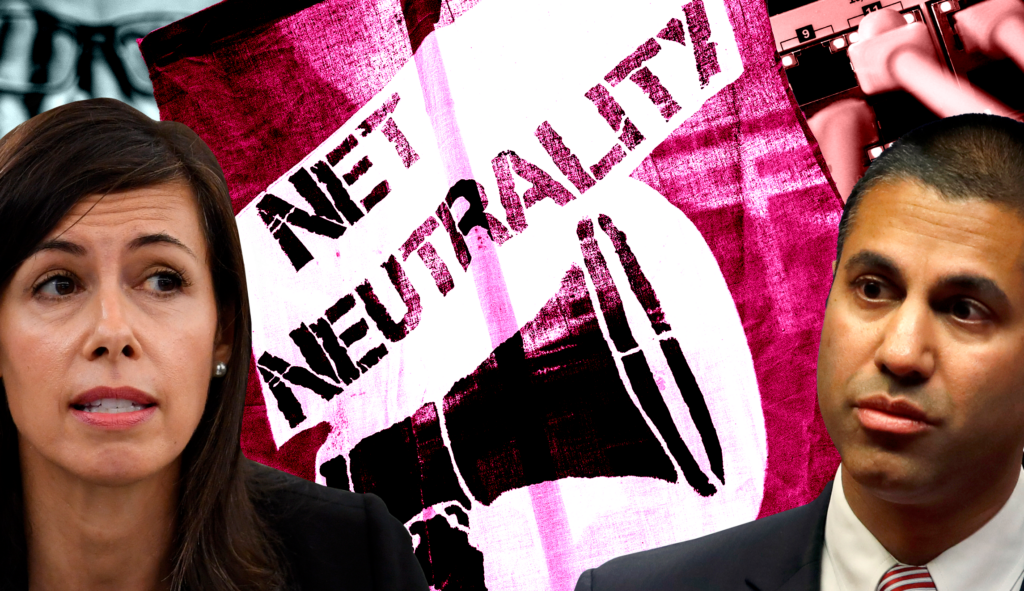
Open internet regulations whose repeal became a cause celebre of sorts among “Resistance” types during the Trump presidency are going back on the books.
With backing from the Biden administration, the Federal Communications Commission voted 3-2 on April 25 to reinstitute updated net neutrality regulations. The rules prohibit broadband providers from blocking or slowing down services like Google and Netflix on their networks. Critics say the rules will be too much of a burden on broadband providers and anyway are unnecessary since there’s no record of telecommunications companies slowing down, or “throttling,” specific sites.
It’s the latest partisan turn in a back-and-forth federal rulemaking process stretching back a decade. During the Obama administration, the FCC put in place a set of net neutrality rules. After Donald Trump became president, his chosen FCC chairman, Ajit Pai, successfully led the process of undoing net neutrality rules.

But not before becoming the comedic target of MAX host John Oliver, who urged viewers of his weekly show to go to the FCC’s website to voice their support for the net neutrality regulations then in place. The issue, until then largely an area of interest among telecom professionals and law professors, became a symbol of the broader “Resistance” movement to Trump.
The Biden administration is now facing only limited public criticism over the reimposition of net neutrality rules. The change, though, will almost certainly trigger immediate legal challenges from the broadband industry.
The incoming rules will make the blocking of any legal content illegal, including access to websites. They also will make throttling, the intentional limiting or slowing of available bandwidth, illegal. Lastly, they prohibit paid prioritization of data, or so-called fast lanes, on networks.
The FCC’s reclassification may open the door to other types of regulation beyond net neutrality rules as well, though opposition won’t likely reach the Trump years fever pitch. Back then, some critics warned of widespread data manipulation, including a now infamous tweet from Senate Democrats, predicting the internet loading one word at a time.
None of those dire predictions materialized in the seven years since the most recent net neutrality repeal. Broadband access, speed, and affordability have all generally improved, ostensibly benefitting from robust private industry investment. Nonetheless, the current FCC made restoration of net neutrality rules a priority after a delayed gain of a third Democratic commissioner, breaking a party deadlock at the agency that had prevented action earlier.
The agency is currently aiding in allocating roughly $42 billion in federally funded broadband subsidies to states. It’s an unprecedented amount of government spending in the area, and implementation is proving controversial.
The FCC is also trying to find workarounds to keep innovation moving forward in the telecommunications industry, with Congress having let spectrum auction authority expire for the first time since the allocation system began. In light of these massive challenges, the re-upping of net neutrality is a curious choice for the FCC.
Some critics of net neutrality go further to argue that the regulatory change won’t be without harmful consequences. Evan Swarztrauber, a senior fellow at the Foundation for American Innovation, told the Washington Examiner, “The worst consequence of Title II will be reduced investment by broadband providers, particularly smaller ones that will divert precious resources into lawyering and compliance that could’ve gone into fiber, antennae, or network equipment.”
Because Congress has failed to weigh in, declining to pass legislation explicitly authorizing net neutrality’s prohibitions on blocking, throttling, or paid prioritization of data, the FCC’s decision almost certainly will be challenged in court. At issue will be the agency’s authority to make decisions of major economic impact without explicit permission from Congress.
Known as the major questions doctrine, the Supreme Court has been increasingly interested in the agency authority question. Early jurisprudence indicates that the major questions doctrine raises two questions for the courts. First, does the agency’s action involve vast economic and political consequences? Second, is there clear congressional authorization for the power the agency asserts?
The regulation of broadband, a service valued in the billions of dollars and serving hundreds of millions of people, would seem to satisfy the first test. Since Congress has not spoken comprehensively on telecommunications since 1996, it’s possible the second question will prove problematic for the FCC.
If the FCC’s reclassification of broadband eventually makes its way to the Supreme Court, which observers think is likely, the court may take the opportunity to curtail agency authority and, in doing so, prevent net neutrality regulations from going into effect.
Beyond what happens in court, net neutrality may also be defeated by changing political winds, particularly if President Joe Biden loses to Trump in their fall rematch of the 2020 campaign, which would lead to the replacement of current FCC Chairwoman Jessica Rosenworcel, who has led the recent fight for net neutrality rules.
“If Trump wins the White House, it would be customary for Chairwoman Rosenworcel to step down,” Swarztrauber said. “Trump could then appoint one of the two Republicans as acting or permanent chair. That Republican chair could then begin the process of drafting a repeal.”
CLICK HERE TO READ MORE FROM THE WASHINGTON EXAMINER
Swarztrauber explained that a Trump win, coupled with the possibility of a Republican-controlled Senate, could mean net neutrality regulations would only be in effect for a few months before being repealed — again.
He added, “However, the agency may choose to wait to see how the courts rule so as not to preempt a potential SCOTUS ruling.”




